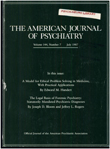The dexamethasone suppression test and mood following stroke
Abstract
Dexamethasone suppression tests (DSTs) were given to 65 acute and chronic stroke patients. For patients who had had a stroke less than 1 year earlier, nonsuppression on the DST was significantly associated with the presence of poststroke depression. The authors, who used the DSM-III symptom criteria for major depression, found that DST sensitivity was 67% but specificity was only 70%. False positive tests in the stroke patients seemed related to large lesion volume. The DST, although of limited clinical utility in this population because of false positive tests, may help define more homogeneous subtypes of poststroke depression for research.
Access content
To read the fulltext, please use one of the options below to sign in or purchase access.- Personal login
- Institutional Login
- Sign in via OpenAthens
- Register for access
-
Please login/register if you wish to pair your device and check access availability.
Not a subscriber?
PsychiatryOnline subscription options offer access to the DSM-5 library, books, journals, CME, and patient resources. This all-in-one virtual library provides psychiatrists and mental health professionals with key resources for diagnosis, treatment, research, and professional development.
Need more help? PsychiatryOnline Customer Service may be reached by emailing [email protected] or by calling 800-368-5777 (in the U.S.) or 703-907-7322 (outside the U.S.).



